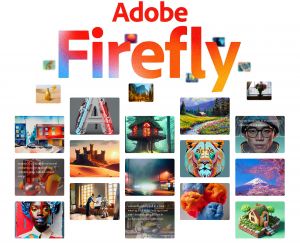Adobe Firefly: Difference between revisions
(Created page with "== Adobe Firefly == Adobe Firefly is a family of creative generative AI models being integrated into Adobe products. Firefly aims to enhance the creative process by providing new ways for creators to ideate, create, and communicate, while significantly improving creative workflows. Initially focusing on image and text effect generation, Firefly has the potential to expand its capabilities across various forms of media, including digital imagin...") |
No edit summary |
||
| (9 intermediate revisions by one other user not shown) | |||
| Line 1: | Line 1: | ||
{{stub}} | |||
Adobe Firefly is a family of creative generative [[Artificial Intelligence | {{see also|artificial intelligence applications|image generation apps}} | ||
[[File:adobe firefly1.jpeg|300px|right]] | |||
[[Adobe Firefly]] is a family of creative [[generative]] [[Artificial Intelligence]] [[(AI)]] [[models]] that are being integrated into [[Adobe]] products to provide a wide range of creative possibilities for users. These AI models can be utilized across various domains, including [[digital imaging]], [[photography]], [[illustration]], [[graphic design]], [[video]], [[marketing]], [[social media]], and [[3D modeling]]. | |||
== Features | ==Features== | ||
=== Digital Imaging and Photography === | ===Digital Imaging and Photography=== | ||
Firefly | Adobe Firefly aims to introduce context-aware image generation, allowing users to quickly experiment and refine their ideas. This feature can save creators significant time by instantly adding elements from their imagination into their compositions. | ||
=== Illustration, Artwork, and Graphic Design === | ===Illustration, Artwork, and Graphic Design=== | ||
With Firefly, | With Adobe Firefly, users will be able to generate custom vectors, brushes, and textures using simple language or sketches. This functionality will be integrated with existing Adobe tools, enabling seamless editing and customization of the generated assets. | ||
=== Video === | ===Video=== | ||
Firefly explores the potential of text-based video editing, allowing users to describe desired changes in mood, atmosphere, or weather and instantly apply those adjustments to their videos. This feature simplifies the process of modifying colors and settings in video content. | |||
=== Marketing and Social Media === | ===Marketing and Social Media=== | ||
Firefly aims to simplify the creation of unique posters, banners, | Adobe Firefly aims to simplify the creation of unique posters, banners, social posts, and more with simple text prompts. Additionally, users will be able to upload mood boards to generate completely original and customizable content. | ||
=== 3D Modeling === | ===3D Modeling=== | ||
In the future, Firefly | In the future, Adobe Firefly is expected to support the generation of photorealistic images from simple 3D compositions and facilitate the rapid creation of new styles and variations of 3D objects. | ||
== | ==Firefly's Data Sources== | ||
The current Firefly generative AI model is trained on a dataset consisting of Adobe Stock images, openly licensed works, and public domain content where copyright has expired. As Firefly develops, Adobe is exploring ways for creators to train the machine learning model with their assets, enabling them to generate content that aligns with their unique style, branding, and design language without the influence of other creators' content. | |||
== Responsible AI | ==Adobe's Commitment to Responsible Generative AI== | ||
Adobe is | Adobe is dedicated to the responsible development of creative generative AI, prioritizing creators' needs and focusing on improving the creative process. As Firefly evolves, Adobe plans to continue collaborating with the creative community to ensure the technology remains supportive and beneficial to users. | ||
== | ===Enhancing the Creative Process=== | ||
== | Adobe Firefly seeks to expand users' natural creativity by providing generative AI tools specifically designed for creative needs, use cases, and workflows within Adobe products. | ||
=== | ===Providing Practical Advantages=== | ||
After the beta stage, Adobe Firefly will offer commercial use options for generated content. Adobe also plans to develop different Firefly models tailored to various use cases, providing creators with more choices. | |||
=== | ===Setting Standards for Responsibility=== | ||
Adobe is | Adobe is actively participating in initiatives like the [[Content Authenticity Initiative]] ([[CAI]]) and [[Coalition for Content Provenance and Authenticity]] ([[CCPA]]), which promote accountability, responsibility, and transparency in generative AI. Adobe is also working towards implementing a universal "Do Not Train" Content Credentials tag, ensuring that content creators can maintain control over the use of their work. | ||
=== | ===Compensation for Adobe Stock Contributors=== | ||
Adobe is in the process of developing a compensation model for Adobe Stock contributors whose content is used in the Firefly training dataset. Details of this compensation model will be released when Firefly exits the beta stage. | |||
=== | ===Preventing Copyright Infringement=== | ||
Adobe addresses copyright infringement concerns by training the initial Firefly model on Adobe Stock images, openly licensed content, and public domain content where copyright has expired. This approach aims to ensure responsible content generation. | |||
== | ==Research and Development== | ||
Adobe | Adobe is continuously exploring new ways in which generative AI can help creators express their ideas. Some areas of research include: | ||
===Progressive Controllable Image Synthesis=== | |||
This research area focuses on how simple marks, such as lines drawn with a stylus, can be combined with AI to produce desired results with minimal brushstrokes, simplifying the image editing process. | |||
===Customizable Diffusion=== | |||
Customizable diffusion allows creators to select the images that inform the generative AI, providing more creative control over individual images and streamlining the application of creative choices across multiple works. | |||
===Generative Image Compositing=== | |||
Generative image compositing simplifies the process of combining elements from multiple photos while maintaining a natural appearance. This AI-assisted approach reduces the time spent on adjustments such as color, shading, perspective, and shadows. | |||
[[Category:AI apps]] [[Category:Image generation apps]] | |||
Latest revision as of 07:39, 25 March 2023
- See also: artificial intelligence applications and image generation apps
Adobe Firefly is a family of creative generative Artificial Intelligence (AI) models that are being integrated into Adobe products to provide a wide range of creative possibilities for users. These AI models can be utilized across various domains, including digital imaging, photography, illustration, graphic design, video, marketing, social media, and 3D modeling.
Features
Digital Imaging and Photography
Adobe Firefly aims to introduce context-aware image generation, allowing users to quickly experiment and refine their ideas. This feature can save creators significant time by instantly adding elements from their imagination into their compositions.
Illustration, Artwork, and Graphic Design
With Adobe Firefly, users will be able to generate custom vectors, brushes, and textures using simple language or sketches. This functionality will be integrated with existing Adobe tools, enabling seamless editing and customization of the generated assets.
Video
Firefly explores the potential of text-based video editing, allowing users to describe desired changes in mood, atmosphere, or weather and instantly apply those adjustments to their videos. This feature simplifies the process of modifying colors and settings in video content.
Marketing and Social Media
Adobe Firefly aims to simplify the creation of unique posters, banners, social posts, and more with simple text prompts. Additionally, users will be able to upload mood boards to generate completely original and customizable content.
3D Modeling
In the future, Adobe Firefly is expected to support the generation of photorealistic images from simple 3D compositions and facilitate the rapid creation of new styles and variations of 3D objects.
Firefly's Data Sources
The current Firefly generative AI model is trained on a dataset consisting of Adobe Stock images, openly licensed works, and public domain content where copyright has expired. As Firefly develops, Adobe is exploring ways for creators to train the machine learning model with their assets, enabling them to generate content that aligns with their unique style, branding, and design language without the influence of other creators' content.
Adobe's Commitment to Responsible Generative AI
Adobe is dedicated to the responsible development of creative generative AI, prioritizing creators' needs and focusing on improving the creative process. As Firefly evolves, Adobe plans to continue collaborating with the creative community to ensure the technology remains supportive and beneficial to users.
Enhancing the Creative Process
Adobe Firefly seeks to expand users' natural creativity by providing generative AI tools specifically designed for creative needs, use cases, and workflows within Adobe products.
Providing Practical Advantages
After the beta stage, Adobe Firefly will offer commercial use options for generated content. Adobe also plans to develop different Firefly models tailored to various use cases, providing creators with more choices.
Setting Standards for Responsibility
Adobe is actively participating in initiatives like the Content Authenticity Initiative (CAI) and Coalition for Content Provenance and Authenticity (CCPA), which promote accountability, responsibility, and transparency in generative AI. Adobe is also working towards implementing a universal "Do Not Train" Content Credentials tag, ensuring that content creators can maintain control over the use of their work.
Compensation for Adobe Stock Contributors
Adobe is in the process of developing a compensation model for Adobe Stock contributors whose content is used in the Firefly training dataset. Details of this compensation model will be released when Firefly exits the beta stage.
Preventing Copyright Infringement
Adobe addresses copyright infringement concerns by training the initial Firefly model on Adobe Stock images, openly licensed content, and public domain content where copyright has expired. This approach aims to ensure responsible content generation.
Research and Development
Adobe is continuously exploring new ways in which generative AI can help creators express their ideas. Some areas of research include:
Progressive Controllable Image Synthesis
This research area focuses on how simple marks, such as lines drawn with a stylus, can be combined with AI to produce desired results with minimal brushstrokes, simplifying the image editing process.
Customizable Diffusion
Customizable diffusion allows creators to select the images that inform the generative AI, providing more creative control over individual images and streamlining the application of creative choices across multiple works.
Generative Image Compositing
Generative image compositing simplifies the process of combining elements from multiple photos while maintaining a natural appearance. This AI-assisted approach reduces the time spent on adjustments such as color, shading, perspective, and shadows.


